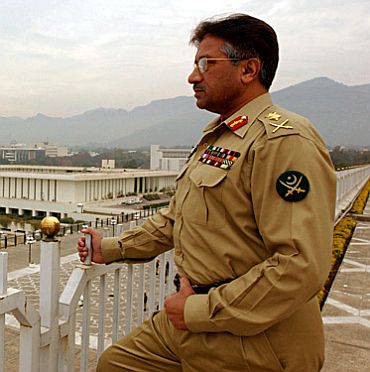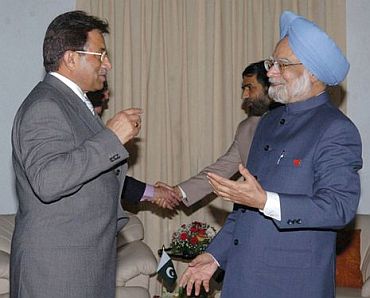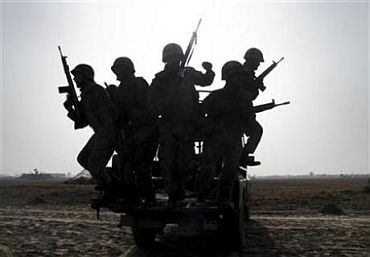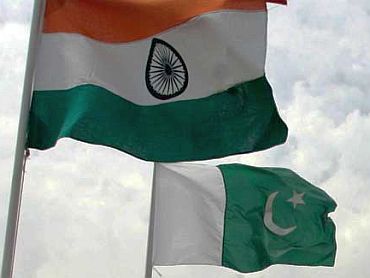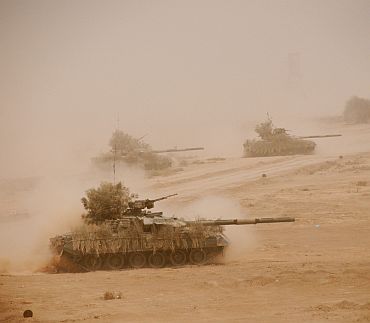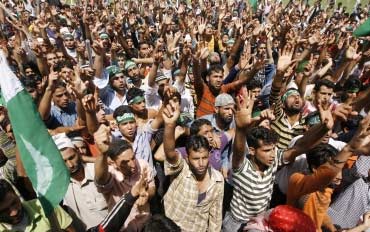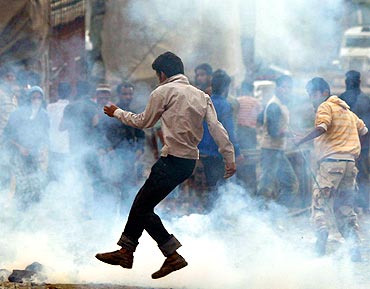 | « Back to article | Print this article |
No takers in Pak for Musharraf's Kashmir solution?
A former Pakistani army chief and senior intelligence official, who was a close aide and confidant to Pervez Musharraf, has completely dismissed the much hyped proposals on Kashmir by the erstwhile President and military dictator that were widely reported as having been the closest India and Pakistan had come to a resolution of this historic imbroglio.
The ex-intelligence official, who did not want to be names, pooh-poohed the contention that the Kashmir dispute was close to a resolution on the strength of Musharraf's proposals.
"My contention is that these proposals were not sellable in Pakistan and that is why President Musharraf was compelled to discuss this only with a very small circle of 5-10 people," he said.
"The cabinet was not aware of it, the armed forces were not aware of it," he said, and contended, "I am quite sure, and I was sure then and I am sure now, he will not be able to sell them in the parliament of Pakistan, the public of Pakistan, the armed forces of Pakistan, and even to those well meaning people who want normalisation and a peaceful relationship between India and Pakistan."
Reportage: Aziz Haniffa in Washington, DC
No takers in Pak for Musharraf's Kashmir solution?
Leaked cables from whistle-blower website WikiLeaks last week spoke of how an optimistic Musharraf had told a high-powered United States Congressional delegation in 2007 that India and Pakistan were on the verge of a deal on Kashmir.
The State Department cable leaked by WikiLeaks said that Musharraf, in a meeting with the Congressional delegation on January 27, 2007, had said he and Prime Minister Manmohan Singh would "Soon -- sooner than anyone might think," resolve the Kashmir dispute.
No takers in Pak for Musharraf's Kashmir solution?
The State Department cable had said, "An agreement should not land like a bombshell Leaders must prepare their public, as he (Musharraf) is doing in Pakistan."
But the former top army and intelligence official said Musharraf was having delusions and said his proposals "amounted to accepting the status quo as it has been for the last 64-65 years and the Line of Control."
He scoffed, "Now as a military ruler you can say to yourself that, 'Oh, I've got a very rational solution,' but that would not be accepted first, within Pakistan."
"He would not be able to sell it to his own government, and that was the government chosen by him (Musharraf)," said the ex-army chief, who later became the top intelligence official.
No takers in Pak for Musharraf's Kashmir solution?
He argued, "India should not have ended the (composite) dialogue. It is not to their advantage also. And it is no concession to Pakistan to have a dialogue. It is not a concession they (India) is giving. It is in the interests of both countries, more so when there are problems, when there are issues, it is all the more important to continue the dialogue."
"Unfortunately, it is not only now, but through history, the Indians have been using a dialogue with Pakistan as some sort of an incentive -- that you do this and then we will have a dialogue with you, and if you don't do this, then we will not have a dialogue. Now, you can't have that sort of a process."
No takers in Pak for Musharraf's Kashmir solution?
"And, then we also found that the CBMS were not an end in itself. You can't just have CBMs after CBMs, and dialogue after dialogue they are means to an end. They are means to resolving issues. They are not just for the sake of having more and more CBMs," he said.
The former official said, "If I recall correctly, more than 50-60 agreements on different CBMs had no effect. One incident (26/11 terror attacks) and the whole thing was undone. So, you can't really build on unresolved issues of the dimension of Kashmir. It creates very serious emotions in Pakistan."
No takers in Pak for Musharraf's Kashmir solution?
"And, you see today, Kashmir is again on the boil, but fortunately, Pakistan is not being blamed -- it is a spontaneous uprising. It has been continuously so for the last three years and not any militants -- Lashkar-e-Tayiba and so on have been involved," he said.
The former army chief and intelligence official also was adamant and unshakeable in his insistence that India remained the foremost external existential threat to Pakistan.
He continued to refer to 1999 during the Kargil war and then 2001-2002, "where again we found the Indian army on our borders threatening to invade Pakistan and these were not limited to incursions or something -- it was a whole scale possibility of a whole scale war."
No takers in Pak for Musharraf's Kashmir solution?
The former official said that even now, India continues to talk about a limited war between India and Pakistan "under a nuclear overhang, and why is this mentioned? Because there is a perception that because both countries are nuclear weapon states that could deter a war, but despite that, the Indian thinking is that, 'No, it is possible to wage a war with Pakistan while staying below the nuclear threshold'. They are saying this -- their army chief is saying this, and their defence minister is saying this."
When he was challenged about official tolerance of terror outfit Lashkar-e-Tayiba by Islamabad, he shot back that Pakistan has to prioritise how it fights these extremist organisations.
"Please understand, when you put the LeT on top; then you are distorting our priorities. You are making topsy-turvy for us. We have to first tackle the person who is carrying out suicide attacks in Islamabad, and Lahore and Karachi, and the Lashkar-e-Tayiba has not been doing that. That much I can tell you," he said.
